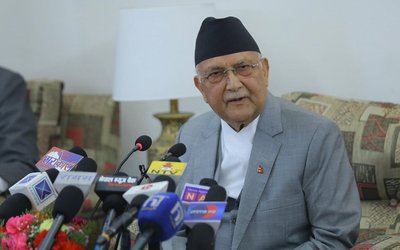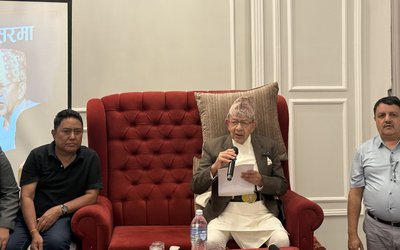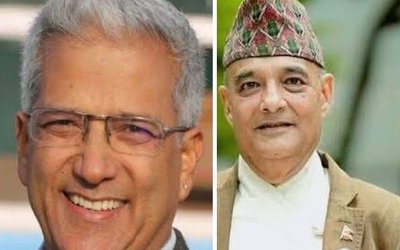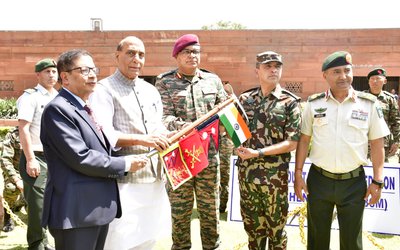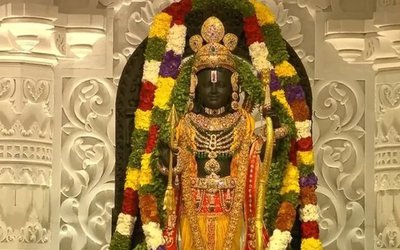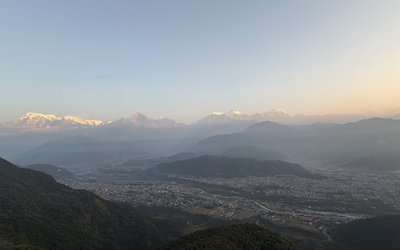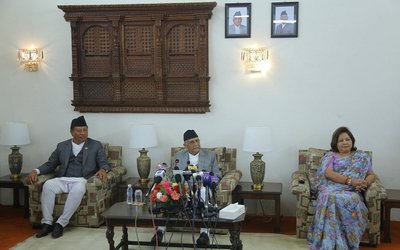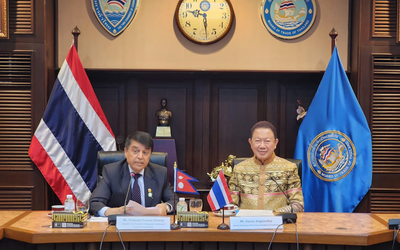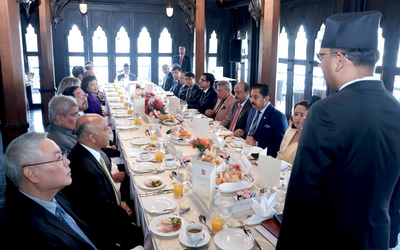
Leaders of Nepal's major political parties have been saying that Nepal cannot make economic progress and democratize its political system without the promulgation of the new constitution. However, the state of Israel has shown that a written constitution is not the panacea to all ills as it has been doing a good job even without writing the constitution.
For almost six decades, Israel has been the only country in the Arab world with perfect match of democracy and economic prosperity. Although Nepali politicians cite Israel’s political model in the constitutional debates, they have never talked about Israel’s functioning democracy and economic prosperity. CPN-UML has been proposing Israel’s previous model of directly elected prime ministerial system in new constitution but not a system without constitution.
“With the ethnic, linguistic and religious diversity, Nepal needs a written constitution. Israel’s system of directly elected prime minister is perfect for Nepal’s situation,” said CA member Ganga Lal Tuladhar.
Nepal has already torn down five constitutions in the last six decades with sluggish economic progress as a member of the Least Developed Countries. In that same period, Israel has achieved high economic progress by successfully holding periodic elections.
Governments fall back on the parliament and are formed through periodical elections. Instability in government has nothing to do with its progress. Situated in hostile environment of facing frequent terror attacks, Israeli society and political system have shown that they can make progress despite everything.
In the last sixty years of democratization, Nepal has seen frequent changes of government, producing more than two dozen prime ministers. Similar is the case with Israel where the coalition governments of several parties have been formed and broken from time to time. Nepal has got seven prime ministers in just the last seven years alone.
Israel’s Experiences
Israel does not have a written constitution. According to the Proclamation of Independence a constituent assembly should have prepared a constitution by October 1, 1948. The delay in the preparation of a constitution resulted primarily from the problems that emerged against the background of the alleged clash between a secular constitution and the Halacha (the Jewish religious law).
Despite what the Proclamation of Independence of the State of Israel states regarding the preparation of a constitution by the Constituent Assembly, Israel has no written constitution in the formal sense, even though it has a constitution in the material sense - in other words, laws and basic rules that lay down the foundations of the system of government and the rights of the individual.
Some of these are formulated in basic laws, some are scattered in other laws, and part - at least until the passing of basic laws dealing with human and civil rights - were interpreted and formulated in a series of decisions by the Supreme Court.
The Supreme Court ruled that the Proclamation of Independence does not have the validity of a constitutional law, and that it is not a supreme law, in light of which laws and regulations that contradict it are nullified.
Nepal has promulgated five written constitutions adhering to all democratic ideals, independent judiciary and periodical elections as well guaranteeing basic human rights in the six decades. However the constitution has nothing delivered. Instead, Nepal’s constitutions were thrown out one after other making citizens helpless.
Once again Nepalese political leaders are selling the dream of new constitution to achieve a measure of economic prosperity. As political disputes continue over the fundamental issues of constitution, the voice is emerging inside why not go without the constitution.
“If the state of Israel can guarantee stability and economic prosperity without a constitution, it is better to follow the Israeli model,” said Govinda Raj Joshi, former home minister and leader of Nepali Congress. If nobody believes in constitution, what sense does it make to promulgate it?”
Israel has been holding the elections for parliament or Knesset in every four years. The unicameral parliament consists of 120 lawmakers, known as Knesset members or MKs, each chosen to represent their respective political parties for terms lasting no longer than four years between elections.
The Knesset elections are supposed to take place every four years. The Knesset can decide, by an ordinary majority, to dissolve itself and call for early elections. Under the direct vote for Prime Minister System, the Prime Minister could notify the President of early elections.
With the disputes among the political parties like in Nepal, Israel deferred to promulgate the constitution. “If we cannot make consensus for the constitution, Nepal can also defer writing the new constitution,” said NC leader Joshi.
Unlike Israel, the Nepalese society has yet to fully respect the rule of law, democratic culture and values. With the strong judiciary capable to defend the Individual’s right and dignity, Israel could go without the constitution. Can Nepal learn from it?
- IME GROUP: Expands Into Paper Industry
- Mar 24, 2025
- CPN UML: Instigated By India
- Mar 23, 2025
- ADB’S CHIEF ECONOMIST: Nepal Reduces Poverty
- Mar 11, 2025
- FM DR. DEUBA: A Successful Visit
- Mar 11, 2025
- MD GHISING: Target Of Personal Grudge
- Mar 09, 2025
